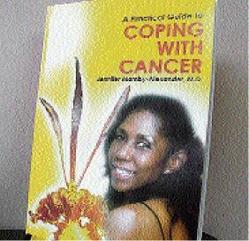Dr Jennifer Mamby-Alexander, Contributor

Dr Jennifer Mamby-Alexander's newly launched book, 'A Practical Guide to Coping With Cancer'. - Alana Igbe/Freelance Photographer
This is the second in our series of articles by Dr Jennifer Mamby-Alexander
Getting information from your doctor
The time between the diagnosis and the start of the treatment can be particularly difficult because there is still uncertainty that causes anxiety, anger, fright and a feeling of loss of control. Here are a few tips that may help you cope:
1. Make a list of questions to ask your doctor before your visit, and take a friend or family member with you not only for support, but to help you recall what your doctor has said, especially if your health-care professionals are strangers. Write down answers that are given to you.
2. Learn as much as possible about the cancer and its treatment. For some people, seeking information and using that information to make decisions helps them feel a bit more in control.
3. Ask questions repeatedly if you do not understand what you are being told.
4. Ask specific questions about removing the lump, against removing the breast.
5. Ask about breast reconstruction and if it can be done immediately or later if desired.
6. Get all the information about side effects of the treatments, those which are lasting and those which are transient. You should also ask if the treatment will affect you having children in the future.
7. Do not feel guilty about getting a second opinion. Good doctors are never offended by this.
8. Learn about the tests that your health insurance covers and those that it does not.
9. Do not let grief and visits to the doctor take over your daily routine.
10. Look beyond the cancer, stay busy, go to work and continue your hobbies even in a limited way.
Remember that the extreme uncertainty that comes with a new cancer diagnosis often fades as you and your family understand more about the disease, treatment and how you will cope.
If you find that fear and uncertainty are interfering with daily activities, counselling and support programmes can help. Let your doctor or another member of your health-care team know if you or someone in your family would like to talk with a counsellor or someone who has been through a similar cancer experience.
Next week: Telling others about your diagnosis of breast cancer. Jennifer Mamby-Alexander, MD, author of 'A Practical Guide to Coping With Cancer' .Tele: 8769290424. Email: mambygirl@yahoo.com.

